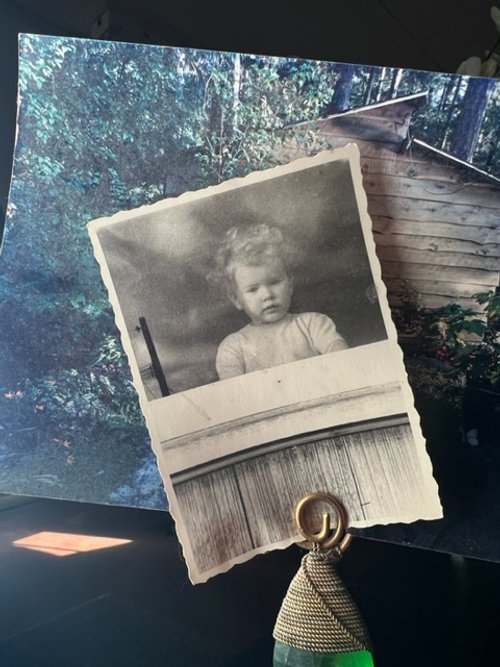"Immigration"
"My paternal grandmother, Josephine Binns, was born in Cork and once shared with me on one of my summer stays with her, the silence that fell over her parents whenever the United States came up in conversation. Letters from cousins spoke of “No Irish Need Apply” signs, street mobs, and churches set aflame. When her family sailed from Ireland in 1910, they stayed on the Atlantic lanes past Ellis Island and boarded a second steamer north, trusting the overland trip from the Canadian East coast out to the Pacific cedar‑scented fog of Vancouver Island was the better choice for a life in peace.
Original photo: B. Littleton, 4 years old, Port Alberni, B. C. prior to immigration to Santa Barbara, California.
Their caution was not paranoia. Between 1820 and 1930 more than 4.5 million Irish men, women, and children landed on American docks, nearly half of all U.S. immigrants during the potato‑famine 1840s, when more than a million fled starvation in just five brutal years. Many walked straight into another gauntlet. Classified ads in New York and Boston still ran “NINA” notices: shorthand for “No Irish Need Apply”, well into the new century, while cartoons inked Irish faces into ape‑snouted drunks clutching clubs, a quick sketch that branded them as born criminals and rapists.
Caricature often turned lethal. In Philadelphia, in 1844 anti‑Catholic rioters burned Irish churches and left at least twenty dead. A decade later the so‑called Bloody Monday in Louisville claimed twenty‑two more lives as Know‑Nothings tried to stop Irish Catholics from voting. Not one rioter saw a prison cell.
Even when the shooting paused, the work itself could kill you. Irish men blasted rock for the Erie Canal and the railroads; so many died that foremen muttered an Irishman was buried under every tie. Those who survived hauled bricks, swept docks, and carried hods on scaffolds for day wages that barely covered a pine coffin. Irish women fared little better. In Kingston, New York, ninety‑four percent of employed Irish women in 1860 worked under indentured servitude as maids, cooks, or laundresses, all called Bridget no matter their real names.
Over decades, bruised knuckles turned into ballot clout. Irish Americans filled police and fire departments, then city halls, turning the old slur of "rowdy Mick" into the uniform of public authority. Yet, when John F. Kennedy announced his candidacy in 1960, pamphlets still warned that a Catholic president would take orders from Rome. His victory was a sigh of relief and a turn toward validation in my family’s kitchen, and my father whispered that they had finally let one of us steer the ship.
Leaving home is rarely whimsy. My great‑grandparents fled hunger and eviction. The first English Puritans fled religious control, crushing debts, and class ceilings of their own. They crossed an ocean believing freedom and a livable wage and safety waited on the far shore. Yet, every arrival rewrote someone else’s map. For the Indigenous nations who already stewarded this continent for thousands of years, tens of millions strong before 1492, the newcomers’ hunger for land triggered epidemics, forced removals, and population collapse. Scholars now estimate a pre‑contact population of 45‑60 million across the Americas; within centuries disease and war reduced that number by up to ninety percent in some regions. Genocide is real, and is the foundation of this country. The cost of one group’s escape became another’s catastrophe.
The engine behind those conquering trade‑offs is something called hegemony, the invisible script that lets the group in charge label its own worldview as normal while marking others as problems to solve. It keeps humming when we stop noticing it. You can hear it in today’s headlines: National Guard trucks rolling into Los Angeles, detention centers packed with families at the southern border, and chants aimed at new arrivals that rhyme painfully with the jeers that once chased Josephine’s parents past Ellis Island.
I keep my grandmother’s sea‑worn trunk by my bed as a side table. I often raise the lid and let the smell of salt and musty paper and linen release, as I search for some new hidden gift I’ve overlooked. Inside are her bits of history, a passage ticket, a cracked rosary, and the truth: people run because staying means hunger, persecution, or a future limited to the size of a landlord’s ledger, and the welcome they receive depends on who already controls the story.
If we remember that an empire’s losses bankrolled our gains, whether Irish canals, Puritan covenants, or the land beneath our feet, we might finally see hegemony for what it is, a story that can be revised. Our task is to hold the door open wider than we found it, to honor both the flight from danger and the roots violently torn up along the way. Racism survives when memory fails; justice begins when we refuse to forget."
Essay by Brenda Littleton
Tin Flea Press, 2025
Original photo: B. Littleton, 4 years old, Port Alberni, B. C. prior to immigration to Santa Barbara, California.

